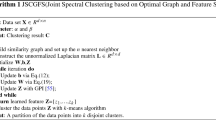Abstract
Clustering high dimensional data with sparse features is challenging because pairwise distances between data items are not informative in high dimensional space. To address this challenge, we propose two novel semi-supervised clustering methods that incorporate prior knowledge in the form of pairwise cluster membership constraints. In particular, we project high-dimensional data onto a much reduced-dimension subspace, where rough clustering structure defined by the prior knowledge is strengthened. Metric learning is then performed on the subspace to construct more informative pairwise distances. We also propose to propagate constraints locally to improve the informativeness of pairwise distances. When the new methods are evaluated using two real benchmark data sets, they show substantial improvement using only limited prior knowledge.
Preview
Unable to display preview. Download preview PDF.
Similar content being viewed by others
References
Basu, S., Bilenko, M., Mooney, R.J.: A probabilistic framework for semi-supervised clustering. In: ACM KDD, Seattle, WA, USA, pp. 59–68 (2004)
Beyer, K., Goldstein, J., Ramakrishnan, R., Shaft, U.: When is nearest neighbor meaningful? In: Beeri, C., Bruneman, P. (eds.) ICDT 1999. LNCS, vol. 1540, pp. 217–235. Springer, Heidelberg (1998)
Bilenko, M., Basu, S., Mooney, R.J.: Integrating constraints and metric learning in semi-supervised clustering. In: ICML, Banff, Alberta, Canada (2004)
Cohn, D., Caruana, R., McCallum, A.: Semi-supervised clustering with user feedback. Technical report, Cornell University (2003)
Ji, X., Xu, W.: Document clustering with prior knowledge. In: ACM SIGIR, Seattle, WA, USA, pp. 405–412 (2006)
Klein, D., Kamvar, S.D., Manning, C.D.: From instance-level constraints to space-level constraints: Making the most of prior knowledge in data clustering. In: ICML, Sydney, Australia, pp. 307–314 (2002)
Park, H., Jeon, M., Rosen, J.B.: Lower dimensional representation of text data based on centroids and least squares. BIT Numerical Mathematics 43, 427–448 (2003)
Shi, J., Malik, J.: Normalized cuts and image segmentation. In: IEEE Trans. on Pattern Analysis and Machine Intelligence (PAMI) (2000)
Wagstaff, K., Cardie, C., Rogers, S., Schrödl, S.: Constrained k-means clustering with background knowledge. In: ICML, pp. 577–584 (2001)
Xing, E., Ng, A., Jordan, M., Russell, S.: Distance metric learning, with application to clustering with side-information. In: NIPS, Vancouver, Canada (2003)
Author information
Authors and Affiliations
Editor information
Editors and Affiliations
Rights and permissions
Copyright information
© 2009 Springer-Verlag Berlin Heidelberg
About this paper
Cite this paper
Yan, S., Wang, H., Lee, D., Giles, C.L. (2009). Pairwise Constrained Clustering for Sparse and High Dimensional Feature Spaces. In: Theeramunkong, T., Kijsirikul, B., Cercone, N., Ho, TB. (eds) Advances in Knowledge Discovery and Data Mining. PAKDD 2009. Lecture Notes in Computer Science(), vol 5476. Springer, Berlin, Heidelberg. https://doi.org/10.1007/978-3-642-01307-2_61
Download citation
DOI: https://doi.org/10.1007/978-3-642-01307-2_61
Publisher Name: Springer, Berlin, Heidelberg
Print ISBN: 978-3-642-01306-5
Online ISBN: 978-3-642-01307-2
eBook Packages: Computer ScienceComputer Science (R0)




